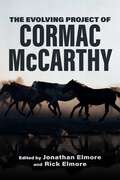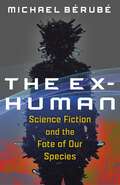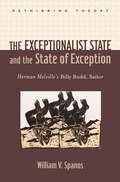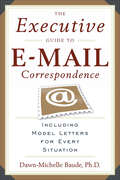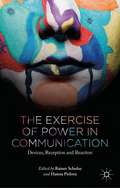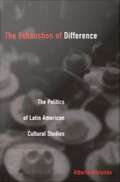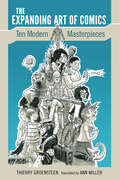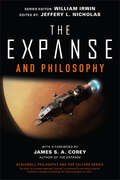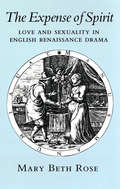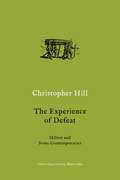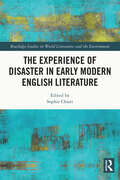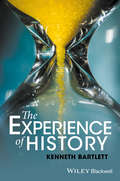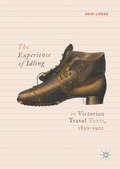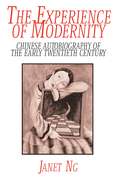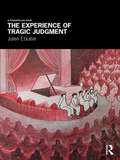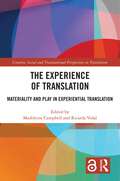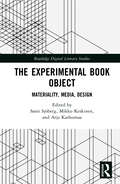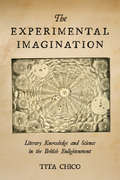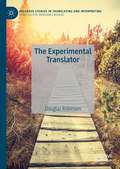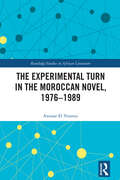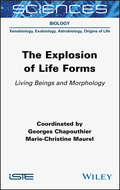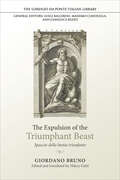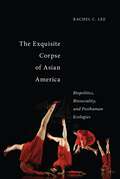- Table View
- List View
The Evolving Project of Cormac McCarthy
by Ahmed Honeini Dr Vernon W. Cisney Jordan Dominy Alex Harmon Dr Trevor Jackson Dr Peter Lurie Dr John Vanderheide Dr Rachel B. Griffis Mgr. Kateřina Kovářová Dr David DeaconThe Evolving Project of Cormac McCarthy presents eleven essays of original scholarship that undertake a programmatic reassessment of McCarthy’s literary and philosophical worldview. Examining issues of race, morality, history, metaphysics, law, economics, and ecology in McCarthy’s writing reveals how these themes intersect in an overarching, positive gesture that characterizes his work. Taken together, the essays offer a more expansive understanding of McCarthy’s critique of contemporary society, while providing new clarity on his vision of alternate ways of living and community beyond their present life-denying manifestations.
The Ex-Human: Science Fiction and the Fate of Our Species
by Michael BérubéFacing threats like climate change and nuclear warfare, science fiction authors have conjured apocalyptic scenarios of human extinction. Can such gloomy fates help us make sense of our contemporary crises? How important is the survival of our species if we wind up battling for an Earth that has become an unhabitable hellscape? What other possible futures do narratives of the end of humanity allow us to imagine?Michael Bérubé explores the surprising insights of classic and contemporary works of SF that depict civilizational collapse and contemplate the fate of Homo sapiens. In a lively, conversational style, he considers novels by writers including Ursula K. Le Guin, Margaret Atwood, Liu Cixin, Philip K. Dick, and Octavia Butler, as well as films that feature hostile artificial intelligence, such as 2001: A Space Odyssey, Blade Runner, and the Terminator and Matrix franchises. Bérubé argues that these works portray a future in which we have become able to see ourselves from the vantage point of something other than the human. Though framed by the possibility of human extinction, they are driven by a vision of the “ex-human”—a desire to imagine that another species is possible. For all science fiction readers worried about the fate of humanity, The Ex-Human is an entertaining yet sobering account of how key novels and films envision the world without us.
The Exceptionalist State and the State of Exception: Herman Melville's Billy Budd, Sailor (Rethinking Theory)
by William V. SpanosCritics predominantly view Herman Melville’s Billy Budd, Sailor as a "testament of acceptance," the work of a man who had become politically conservative in his last years. William V. Spanos disagrees, arguing that the novella was not only a politically radical critique of American exceptionalism but also an eerie preview of the state of exception employed, most recently, by the George W. Bush administration in the post–9/11 War on Terror. While Billy Budd, Sailor is ostensibly about the Napoleonic Wars, Spanos contends that it is at heart a cautionary tale addressed to the American public as the country prepared to extend its westward expansion into the Pacific Ocean by way of establishing a global imperial navy. Through a close, symptomatic reading of Melville’s text, Spanos rescues from critical oblivion the pervasive, dense, and decisive details that disclose the consequences of normalizing the state of exception—namely, the transformation of the criminal into the policeman (Claggart) and of the political human being into the disposable reserve that can be killed with impunity (Billy Budd). What this shows, Spanos demonstrates, is that Melville's uncanny attunement to the dark side of the American exceptionalism myth enabled him to foresee its threat to the very core of democracy in the twentieth and twenty-first centuries. This view, Spanos believes, anticipates the state of exception theory that has emerged in the recent work of Giorgio Agamben, Alain Badiou, Judith Butler, and Jacques Ranciere, among other critical theorists.The Exceptionalist State and the State of Exception illustrates that Melville, in his own time, was aware of the negative consequences of the deeply inscribed exceptionalist American identity and recognized the essential domestic and foreign policy issues that inform the country’s national security program today.
The Executive Guide to E-mail Correspondence: Including Model Letters for Every Situation
by Dawn-Michelle BaudeMake your messages shorter, simpler, and more effective with this guide to writing e-mails that get read—and get results.As we correspond with everyone from international partners to remote workers, writing skills are more important than ever to business and career success. They can make the difference between climbing the corporate ladder and getting stuck on a low rung. An e-mail that’s clear, concise, and targeted will get more than just a response. It will get results—including your boss’s attention.No matter what sector a company is in, excellent written communication skills are in demand—because too-long, wordy, or unclear emails bog down a business. This guide provides insight, guidelines, and a wide variety of templates to help you get it right and rapidly transform basic writing skills into global communications expertise. In a lively, here’s-how style, it:demonstrates the hallmarks of effective business e-mailsfeatures ready-to-use organizational planspresents quick and easy editing techniquesfurnishes before-and-after editing modelsfocuses on the do’s and don’ts of proficient e-mailssupplies practical writing tips and tricks, and more
The Exercise of Power in Communication
by Rainer Schulze Hanna PishwaPower Exercise explores the various choices speakers or communicators make when expressing power relations in modern societies. The volume brings together several disciplines, such as linguistics, sociology, communication studies and social psychology, to give insight into how interactants co-construct different aspects of power in their everyday life. The chapters reveal that the power potential of linguistic elements is dependent on context and is by no means fixed or predetermined, whichprovides implications for research methodology.
The Exhaustion of Difference: The Politics of Latin American Cultural Studies
by Alberto MoreirasThe conditions for thinking about Latin America as a regional unit in transnational academic discourse have shifted over the past decades. In The Exhaustion of Difference Alberto Moreiras ponders the ramifications of this shift and draws on deconstruction, Marxian theory, philosophy, political economy, subaltern studies, literary criticism, and postcolonial studies to interrogate the minimal conditions for an effective critique of knowledge given the recent transformations of the contemporary world. What, asks Moreiras, is the function of critical reason in the present moment? What is regionalistic knowledge in the face of globalization? Can regionalistic knowledge be an effective tool for a critique of contemporary reason? What is the specificity of Latin Americanist reflection and how is it situated to deal with these questions? Through examinations of critical regionalism, restitutional excess, the historical genealogy of Latin American subalternism, testimonio literature, and the cultural politics of magical realism, Moreiras argues that while cultural studies is increasingly institutionalized and in danger of reproducing the dominant ideologies of late capitalism, it is also ripe for giving way to projects of theoretical reformulation. Ultimately, he claims, critical reason must abandon its allegiance to aesthetic-historicist projects and the destructive binaries upon which all cultural theories of modernity have been constructed. The Exhaustion of Difference makes a significant contribution to the rethinking of Latin American cultural studies.
The Expanding Art of Comics: Ten Modern Masterpieces
by Thierry GroensteenIn The Expanding Art of Comics: Ten Modern Masterpieces, prominent scholar Thierry Groensteen offers a distinct perspective on important evolutions in comics since the 1960s through close readings of ten seminal works. He covers over half a century of comics production, sampling a single work from the sixties (Ballad of the Salt Sea by Hugo Pratt), seventies (The Airtight Garage of Jerry Cornelius by Moebius), eighties (Watchmen by Alan Moore and Dave Gibbons), and nineties (Epileptic by David B.). Then this remarkable critic, scholar, and author of The System of Comics and Comics and Narration delves into recent masterpieces, such as Building Stories by Chris Ware.Each of these books created an opening, achieved a breakthrough, offered a new narrative model, or took up an emerging tendency and perfected it. Groensteen recaptures the impact with which these works, each in its own way, broke with what had gone before. He regards comics as an expanding art, not only because groundbreaking works such as these are increasing in number, but also because it is an art that has only gradually become aware of its considerable potential and is unceasingly opening up new expressive terrain.
The Expanse and Philosophy: So Far Out Into the Darkness (The Blackwell Philosophy and Pop Culture Series)
by William IrwinEnter The Expanse to explore questions of the meaning of human life, the concept of justice, and the nature of humanity, featuring a foreword from author James S.A. Corey The Expanse and Philosophy investigates the philosophical universe of the critically acclaimed television show and Hugo Award-winning series of novels. Original essays by a diverse international panel of experts illuminate how essential philosophical concepts relate to the meticulously crafted world of The Expanse, engaging with topics such as transhumanism, belief, culture, environmental ethics, identity, colonialism, diaspora, racism, reality, and rhetoric. Conceiving a near-future solar system colonized by humanity, The Expanse provokes a multitude of moral, ethical, and philosophical queries: Are Martians, Outer Planets inhabitants, and Earthers different races? Is Marco Inaros a terrorist? Can people who look and sound different, like Earthers and Belters, ever peacefully co-exist? Should science be subject to moral rules? Who is sovereign in space? What is the relationship between human progress and aggression? The Expanse and Philosophy helps you answer these questions—and many more. Covers the first six novels in The Expanse series and five seasons of the television adaptation Addresses the philosophical issues that emerge from socio-economics and geopolitics of Earth, Mars, and the Outer Planets Alliance Offers fresh perspectives on the themes, characters, and storylines of The Expanse Explores the connections between The Expanse and thinkers such as Aristotle, Kant, Locke, Hannah Arendt, Wittgenstein, Descartes, and Nietzsche Part of the popular Blackwell Philosophy and Pop Culture series, The Expanse and Philosophy is a must-have companion for avid readers of James S.A. Corey’s novels and devotees of the television series alike.
The Expense of Spirit: Love and Sexuality in English Renaissance Drama
by Mary Beth RoseA public and highly popular literary form, English Renaissance drama affords a uniquely valuable index of the process of cultural transformation. The Expense of Spirit integrates feminist and historicist critical approaches to explore the dynamics of cultural conflict and change during a crucial period in the formation of modern sexual values. Comparing Elizabethan and Jacobean dramatic representations of love and sexuality with those in contemporary moral tracts and religious writings on women, love, and marriage, Mary Beth Rose argues that such literature not only interpreted sexual sensibilities but also contributed to creating and transforming them.
The Experience of Defeat: Milton and Some Contemporaries
by Christopher HillWhat lessons can we learn from the defeat of the seventeenth century English revolution?The failure of the English Revolution in 1660 provoked a variety of responses among radical clergy, intellectuals and writers, as they struggled to accept and account for their defeat in the light of divine providence. Christopher Hill's close analysis of the writings of the Levellers and Diggers, of Fox and other important early Quakers suggests that the revolutionary beliefs and savage social judgments and disillusionments that Milton expressed in his writings at the time were shared by many of his contemporaries. Hill makes a provocative case, as well, that Milton's three great poems--Paradise Lost, Paradise Regained, and Samson Agonistes--came directly out of his painful reassessment of man and his society, and of society's relation to moral order.From the Trade Paperback edition.
The Experience of Disaster in Early Modern English Literature (Routledge Studies in World Literatures and the Environment)
by Sophie ChiariThis book addresses the concept of ‘disaster’ through a variety of literary texts dating back to the early modern period. While Shakespeare’s age, which was an era of colonisation, certainly marked a turning point in men and women’s relations with nature, the present times seem to announce the advent of environmental justice in spite of the massive ecological destructions that have contributed to reshape our planet. Between then and now, a whole history of climatic disasters and of their artistic depictions needs to be traced. The literary representations of eco-catastrophes, in particular, have consistently fashioned the English identity and led to the progress of science and the ‘advancement of learning’. They have also obliged us to adapt, recycle and innovate. How could the destructive process entailed by ecological disasters be represented on the page and thereby transformed into a creative process encouraging meditation, preservation and resilience in the sixteenth and seventeenth centuries? To this question, this book offers nuanced, contextualised and perceptive answers. Divided into three main sections ‘Extreme Conditions’, ‘Tempestuous Skies’, and ‘Biblical Calamities,' it deals with the major environmental issues of our time through the prism of early modern culture and literature.
The Experience of History: An Introduction To History
by Kenneth BartlettThe Experience of History is a lively and passionate introduction to the field that encourages students to seek and appreciate history inside the classroom and beyond. This work: Defines history as a discipline and the role of historians within it Addresses the analytical and critical thinking skills needed to engage with the past Discusses a variety of important topics in the study of history, such as historical evidence, primary documents, divisions of history, forms of historical writing, historiographical traditions, and recent categories of historical research Written by a renowned scholar of European history, this work helps students to become discerning examiners of history and historical evidence in a variety of modern settings like art, architecture, film, television, politics, current events, and more.Learn more about the author and his passion for history in this interview with popular blog Five Books: http://fivebooks.com/interview/ken-bartlett-renaissance-books/.
The Experience of Idling in Victorian Travel Texts, 1850–1901
by Heidi LiedkeThis book brings together theories of spatiality and mobility with a study of travel writing in the Victorian period to suggest that ‘idleness’ is an important but neglected condition of subjectivity in that era. Contrary to familiar stereotypes of ‘the Victorians’ as characterized by speed, work, and mechanized travel, this books asserts a counter-narrative in which certain writers embraced idleness in travel as a radical means to ‘re-subjectification’ and the assertion of a ‘late-Romantic’ sensibility. Attentive to the historical and literary continuities between ‘Romantic’ and ‘Victorian’, the book reconstructs the Victorian discourse on idleness. It draws on an interdisciplinary range of theorists and brings together a fresh selection of accounts viewed through the lens of cultural studies as well as accounts of publication history and author biography. Travel texts from different genres (by writers such as Anna Mary Howitt, Jerome K. Jerome and George Gissing) are brought together as representing the different facets of the spectrum of idleness in the Victorian context.
The Experience of Modernity: Chinese Autobiography of the Early Twentieth Century
by Janet NgAutobiography of the first half of the twentieth century was used variously by different groups of writers to interrogate, negotiate, and even to program the social and political progress of China. However, despite the popularity and success of this genre, it has also been the most forgotten in literary and historical discussions. Personal stories and individual expressions seem to have had no place in 1920s, 1930s, and 1940s China, smothered instead by the grander rhetoric of nationalism. For this reason, autobiography's popularity during the era is an odd phenomenon and also an important genre for study. The May Fourth Era (1917-40) began as a movement to make the classical literary language accessible to the common people and became a broader political movement against imperialism. The writing of autobiography was influenced by the idea of literature's social and political mission, yet at the same time autobiography was a uniquely potent venue for individual expression. Janet Ng examines this notion in The Experience of Modernity within the framework of autobiographical writings by Chen Hengzhe, Lu Xun, Hu Shi, Xie Bingying, Xiao Hong, Eileen Chang, Yu Dafu, and Shen Congwen. Janet Ng is Assistant Professor of Asian Literature, the College of Staten.
The Experience of Tragic Judgment
by Julen EtxabeAdjudication between conflicting normative universes that do not share the same vocabulary, standards of rationality, and moral commitments cannot be resolved by recourse to traditional principles. Such cases are always in a sense tragic. And what is called for, in our pluralistic and conflictual world is not to be found, as many would suppose, in an impersonal set of procedures with which all participants could be treated as having rationally agreed. The very idea of such a neutral system is an illusion. Rather, what is needed, Julen Etxabe argues in this book, is a heightened awareness of the difficulty of judgment. The Experience of Tragic Judgments draws upon Sophocles’ play Antigone in order to consider this difficulty and the virtues that attend its acknowledgment. Based on the transformative experience that the audience undergoes in engaging with this play what is proposed is a reconceptualization of judgment: not as it is generally thought to occur in a single isolated moment, like the falling of an axe, but rather as an experience that develops in and through space and time.
The Experience of Translation: Materiality and Play in Experiential Translation (Creative, Social and Transnational Perspectives on Translation)
by Madeleine CampbellCampbell, Vidal and their contributors expand the notion of translation beyond linguistic, modal and medial borders to embrace posthumanist perspectives through a holistic experiential epistemology which envisions translation as engaged, situated social practice.The first of two volumes, this book focuses on questions of materiality and play. Drawing together contributions on theory, methodology and practice from translators, scholars and practitioners working in the creative and performing arts, this book explores how contemporary, experiential acts of interpretation, mediation and negotiation can serve to bridge social and cultural discontinuities across time and space. These range from ancestral past to digital present, from rural to urban environments across the globe. Experiential translation applies a transdisciplinary lens to problematize views of translation and untranslatability traditionally bound by structuralist frames of reference and the reserve of professional linguistic translation. The chapters in this book apply this experiential lens to understand a pluriverse of creative translation practices where the translator’s subject position in relation to the ‘original’ is transformed by the role of experimentation, creativity and play. This book and its companion volume The Translation of Experience: Cultural Artefacts in Experiential Translation will be of particular interest to translators and arts practitioners, scholars and researchers in the transdisciplinary field of humanities.Funding: This work was supported by UKRI under AHRC Grant AH/V008234/1, awarded to Ricarda Vidal, King’s College London (Principal Investigator) and Madeleine Campbell, University of Edinburgh (Co-Investigator).
The Experimental Book Object: Materiality, Media, Design (Routledge Digital Literary Studies)
by Sami Sjöberg Mikko Keskinen Arja KarhumaaThe Experimental Book Object shows why and how books matter in the 21st century. Digital and audio platforms are commonplace, and other fields of art beyond literature have increasingly embraced books and publication as their medium of choice. Nevertheless, the manifold book object persists and continues to inspire various types of experimentation. This volume sets forth an unprecedented approach where literary and media theory are entangled with design practitioners’ artistic research and process descriptions. By probing the paradigm of the codex, this collection of essays focuses on historical and contemporary experimentation that has challenged what books are and could be from the perspectives of materiality, mediation, and visual and typographic design. Investigations into less-studied areas and cases of performativity demonstrate what experimental books do by interacting with their systemic and cultural environments. The volume offers a multifaceted and multidisciplinary view of the book object, the book design and publishing processes, and their significance in the digital age.
The Experimental Imagination: Literary Knowledge and Science in the British Enlightenment
by Tita ChicoChallenging the "two cultures" debate, The Experimental Imagination tells the story of how literariness came to be distinguished from its epistemological sibling, science, as a source of truth about the natural and social worlds in the British Enlightenment. Tita Chico shows that early science relied on what she calls literary knowledge to present its experimental findings. More radically, she contends that science was made intellectually possible because its main discoveries and technologies could be articulated in literary terms. While early scientists deployed metaphor to describe the phenomena they defined and imagination to cast themselves as experimentalists, literary writers used scientific metaphors to make the case for the epistemological superiority of literary knowledge. Drawing on literature as well as literary language, tropes, and interpretive methods, literary knowledge challenges our dominant narrative of the scientific revolution as the sine qua non of epistemological innovation in the British Enlightenment. With its recourse to imagination as a more reliable source of truth than any empirical account, literary knowledge facilitates a redefinition of authority and evidence, as well as of the self and society, implicitly articulating the difference that would come to distinguish the arts and sciences.
The Experimental Translator (Palgrave Studies in Translating and Interpreting)
by Douglas RobinsonThis book celebrates experimental translation, taking a series of exploratory looks at the hypercyborg translator, the collage translator, the smuggler translator, and the heteronymous translator. The idea isn’t to legislate traditional translations out of existence, or to “win” some kind of literary competition with the source text, but an exuberant participation in literary creativity. Turns out there are other things you can do with a great written work, and there is considerable pleasure to be had from both the doing and the reading of such things. This book will be of interest to literary translation studies researchers, as well as scholars and practitioners of experimental creative writing and avant-garde art, postgraduate translation students and professional (literary) translators.
The Experimental Turn in the Moroccan Novel, 1976-1989 (Routledge Studies in African Literature)
by Anouar El YounssiThe Experimental Turn in the Moroccan Novel, 1976-1989 examines the trajectory of the Moroccan experimental novel and makes a link between its emergence in the early-mid 1970s and the Arab defeat in the six-day war with Israel in 1967.Drawing on works by Muḥammad Barrādah, ʿAbdullāh al-ʿArwī, Aḥmad al-Madīnī, and others, the book contends that the Moroccan experimental novel reflects an historic turning point and transitional cultural landscape. It further shows that the experimental novel laid the ground for a different vision of literature, an important feature of which was the intent to surpass the traditional realist model as executed by Moroccan novelist ʿAbdulkarīm Ghallāb (1919–2017) and Egyptian Nobel laureate Najīb Maḥfūẓ (1911–2006). This new vision of literature seeks to create new discursive spheres for the treatment of the social and the political.This book will be an important contribution to debates around Moroccan/Arabic/Maghrebi literature, as well as to the field of literary experimentalism more broadly.
The Explosion of Life Forms: Living Beings and Morphology
by Marie-Christine Maurel Georges ChapouthierOne of the essential characteristics of living beings is the explosion of variety in their forms that is intrinsically linked to the diversity of the environments they have adapted to. This book, the result of collaboration between international specialists, analyzes the multiplicity of these morphologies. It explores the origin of forms, their role in defining living things, and the relationship between form and function. It exposes the role of genes and epigenetics and examines the forms of bacteria, protists and plants. The Explosion of Life Forms also studies the memory of animals and their sensory processes, the forms of robots (built in the image of living things), and medical technologies aimed at restoring damaged living forms. Finally, this work questions a common principle of construction in the diversity of forms, as well as the idea of an abandonment of the form, a possible hidden defect of some modern philosophies.
The Expulsion of the Triumphant Beast: Spaccio della bestia trionfante (Lorenzo Da Ponte Italian Library)
by Giordano BrunoPublished in London in 1584, The Expulsion of the Triumphant Beast is Giordano Bruno’s first work of moral philosophy. It is dedicated with a long Explicatory Letter to Elizabeth I’s most cultured courtier, Sir Philip Sidney. It is a book about moral reform, expelling the beasts of evil, and putting virtues in their place. Its theme is presented as an allegorical drama in which ancient myths assume modern meanings questioning the ways in which moral and religious reform have been conceived in both the ancient world and the cultures of Renaissance Europe. This new Italian text, based on the original printed text of 1584 held in the British Library, presents a less modernized version than those presently available, while maintaining a modern page format. The aim is to provide a text closer to the sound of Bruno’s original mix of classical Tuscan Italian and Neapolitan dialectical forms. This edition also presents a new translation designed to render Bruno’s complex and baroque Italian into easily readable modern English. Hilary Gatti introduces The Expulsion of the Triumphant Beast, underlining Bruno’s meta-literary reflection on the nature of allegory and myth as well as the dramatic structure of his text. Drama, philosophy, and religion combine in this work to give an epic dimension to the perennial cosmic battle between evil and good.
The Exquisite Corpse of Asian America: Biopolitics, Biosociality, and Posthuman Ecologies (Sexual Cultures #16)
by Rachel C. LeeWinner of the 2016 Association for Asian American Studies Award for Best Book in Cultural StudiesThe Exquisite Corpse ofAsian Americaaddresses this central question: if race has been settled as a legal or socialconstruction and not as biological fact, why do Asian American artists,authors, and performers continue to scrutinize their body parts? Engagingnovels, poetry, theater, and new media from both the U.S. andinternationally—such as Kazuo Ishiguro’s science fiction novel Never Let MeGo or Ruth Ozeki’s My Year of Meats and exhibits like that of BodyWorlds in which many of the bodies on display originated from Chinese prisons—RachelC. Lee teases out the preoccupation with human fragments and posthumanecologies in the context of Asian American cultural production and theory. Sheunpacks how the designation of “Asian American” itself is a mental constructthat is paradoxically linked to the biological body.Through chapters that each use a body part as springboard forreading Asian American texts, Lee inaugurates a new avenue of research onbiosociality and biopolitics within Asian American criticism, focused on theliterary and cultural understandings of pastoral governmentality, the divergentscales of embodiment, and the queer (cross)species being of racial subjects.She establishes an intellectual alliance and methodological synergy betweenAsian American studies and Science and Technology Studies (STS), biocultures,medical humanities, and femiqueer approaches to family formation, carework,affect, and ethics. In pursuing an Asian Americanist critique concerned withspeculative and real changes to human biologies, she both produces innovationwithin the field and demonstrates the urgency of that critique to otherdisciplines.
The Extended Mind
by Robert K. LoganThe ability to communicate through language is such a fundamental part of human existence that we often take it for granted, rarely considering how sophisticated the process is by which we understand and make ourselves understood. In The Extended Mind, acclaimed author Robert K. Logan examines the origin, emergence, and co-evolution of language, the human mind, and culture. Building on his previous study, The Sixth Language (2000) and making use of emergence theory, Logan seeks to explain how language emerged to deal with the complexity of hominid existence brought about by tool-making, control of fire, social intelligence, coordinated hunting and gathering, and mimetic communication. The resulting emergence of language, he argues, signifies a fundamental change in the functioning of the human mind - a shift from percept-based thought to concept-based thought. From the perspective of the Extended Mind model, Logan provides an alternative to and critique of Noam Chomsky's approach to the origin of language. He argues that language can be treated as an organism that evolved to be easily acquired, obviating the need for the hard-wiring of Chomsky's Language Acquisition Device. In addition Logan shows how, according to this model, culture itself can be treated as an organism that has evolved to be easily attained, revealing the universality of human culture as well as providing an insight as to how altruism might have originated. Bringing timely insights to a fascinating field of inquiry, The Extended Mind will be sure to find a wide readership.
